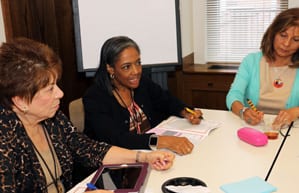One of the world’s leading social entrepreneurs believes a college education has a “multiplier” effect. Students learn material through coursework, and then go out into the world and apply that knowledge, in turn helping and teaching others. 
Jeroo Billimoria, entrepreneur and founder of Child and Youth Finance International gave the keynote presentation at the Financial Capability and Asset Building (FCAB) Curriculum Workshop and Training hosted by the Center for Social Development (CSD) at Washington University in St. Louis in mid-May. FCAB seeks to expand social work’s professional capacity to inform and guide lower income households regarding their financial position, services and relationships. The initiative partners with Minority Serving (Historically Black Colleges and Universities, Tribal Colleges and Universities, and Hispanic Serving Institutions) and other institutions to integrate content from the CSD developed FCAB Curriculum into social work and human service courses at several universities.
Instructors and administrators attending the workshop traveled from 11 institutions scattered throughout the United States, from California State University in Los Angeles to Delaware State University to the Inter American University of Puerto Rico.
Michael Wright of Tennessee State University and Melody Brackett of Elizabeth City State University in North Carolina both taught elements of the FCAB curriculum in the 2013-2014 spring semester, and participated in a panel to share their experiences with other instructors just learning about the material.
“FCAB is a foundational piece,” Wright says. “The current ethos in social work is to have the values and ethics content infused within the curriculum, and I think this is another opportunity for an infusion. There are elements that can be put in each course.”
Brackett’s institution has taken the infusion of FCAB one step further and opened a Financial Capability and Asset Building Resource Center. Through this center, they hope to reach out beyond the students to “train the trainers,” including faith leaders.
“I thought (FCAB) was a good way to expose our students to better opportunities to meet the needs of our clients,” she says. “Finances are something everybody has to deal with.”
Wright agrees. “Money is one of the silver bullets. Understanding money is something that traditionally social work (education) hasn’t had, and yet we all recognize that those are the issues we’re facing. I think the time is right for us to get back to what social work is about, which includes financial capability and asset building.”
CSD partnered with Minority Serving Institutions first because evidence suggests that underserved and minority communities have low levels of financial capability and assets, and thus have a more immediate need for this financial knowledge.
Mary Stephens of Bennett College in North Carolina said many of her students come from low-income families. “So first of all, we need to teach the students about financial capability. They need to learn how to handle their finances so they’re better able to translate that information to our consumers in the field.”
Vanessa Foster-Cooksey, head of community affairs at Wells Fargo Advisors LLC, primary funder for the FCAB Initiative, agrees that students need to grasp the information not only to share with their clients, but first to apply themselves. “Ultimately, in the relationship that is between the social worker and their clients, there is a level of modelship that has to happen.”
She said Wells Fargo Advisors was particularly interested in FCAB, “because we know that in order to see significant change in the community as it relates to economic mobility for low- and moderate-income families, that work has to be done at the human level. This curriculum really meets that need for us.”
The initiative is also supported by The Arthur Vining Davis Foundations.
Andre Stevenson of Bowie State University in Maryland said the training has been very helpful, and he looks forward to eventually infusing the material throughout his school’s social work curriculum. “I believe FCAB is on the cutting edge of social work education.”
Like Brackett, René Dubay of Salish Kootenai College in Montana has plans for the curriculum that takes FCAB above and beyond its original purpose. Not only is she hoping to provide financial capability training to all students at the college – rather than solely the social work students – she hopes to deliver the training to all human service employees in the Confederated Salish and Kootenai Tribes.
“This is important work – it’s defining work – and I think it will make a significant contribution toward a change in the paradigms of social work as a profession,” says Merlin Langley of Florida A&M University.